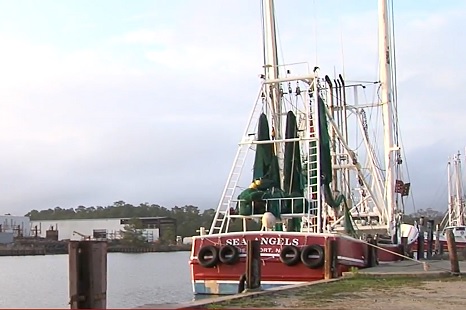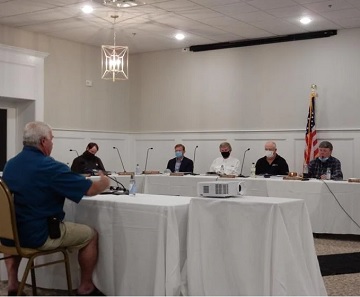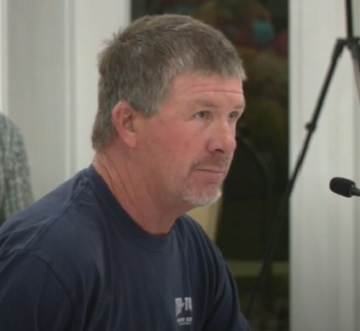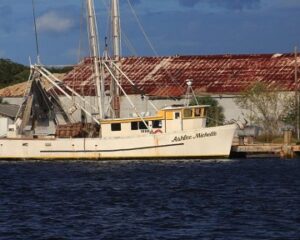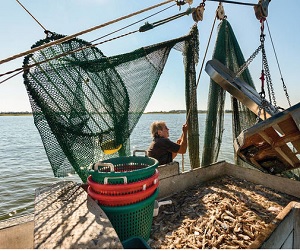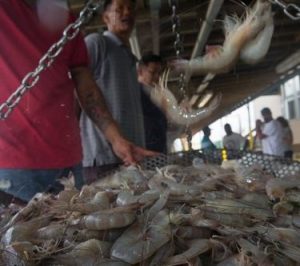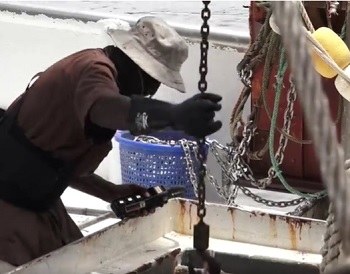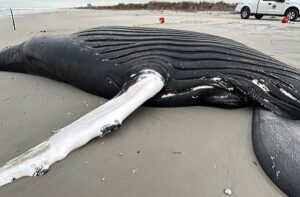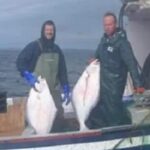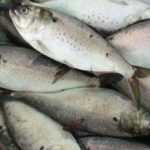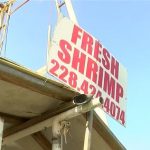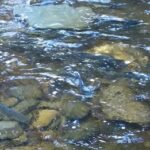You don’t see shrimp trawlers working the sea like you once did. You don’t see them coming in with their photogenic outriggers up. To be clear, trawlers still work the sea but nowhere in numbers like they once did.,, Times were you’d see them out at sea working, nets out, capturing shrimp. Beachgoers would see several trawlers with nets up coming home with a haul. Beachgoers and locals alike knew where to get fresh-caught shrimp and it was no marketing spin. It was the real deal, but those days are slipping away. Regulations, pollution, imports, inaccessible shrimping grounds, mariculture, maintenance costs, aging fleets, and other factors have put the hurt on the shrimping industry. >click to read< 07:36
Tag Archives: shrimpers
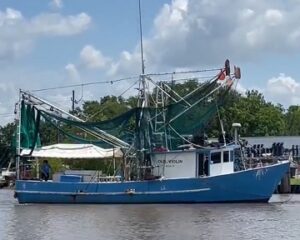
Louisiana shrimpers worry high diesel fuel prices will impact profits
Shrimpers are getting ready to cast their nets, but not without major concerns for the upcoming season. Rising fuel prices could also mean higher prices for the tasty crustaceans. “I know we are going to get hit hard by the fuel prices… You better catch a lot of shrimp,” said Cheryl Granger, owner of Granger’s Seafood in Maurice, La. “I think we’re going to have a very hard time,” Granger said. “Very hard and not just us, the crabbers, the shrimpers; everybody fishing on the water.” >click to read< 08:06
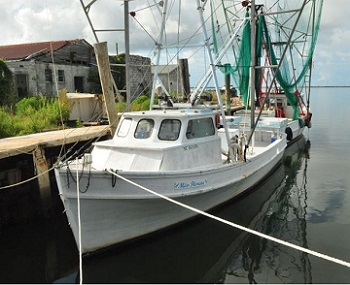
Partial Bogue Sound shrimp trawling ban will have impacts on watermen, economy
Mike Norman, who owns a 35-foot boat and sells shrimp at Norman’s Shrimp in Salter Path, mostly in the summer, said the partial Bogue Sound shrimp trawling ban will have a significant impact, and he believes it’s just the beginning. “They (sports fishermen) got Bogue Sound this year and I guarantee you that in the next couple of years, they’ll get Core Sound and Straits and Adams Creek,” he said. “I’ve been doing this since I was 16 and I’m 61 now. My brother told me the other day I’m going to have to get a job. But that’s hard for a commercial fisherman.” >click to read< 17:58
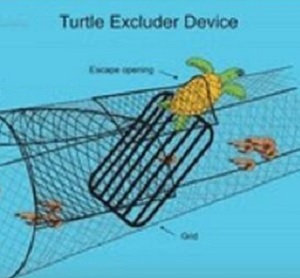
NOAA: Temporary rule allows shrimpers limited tow times as an alternative to TED’s
NOAA is publishing a temporary rule to allow shrimp fishers to continue to use limited tow times as an alternative to Turtle Excluder Devices. According to LDWF, the use will be in specific Louisiana state waters from 91° 23’ West longitude eastward to the Louisiana/Mississippi border, and seaward out three nautical miles. The temporary rule is effective from December 7, 2021 through January 5, 2022. >click to read< 12:02
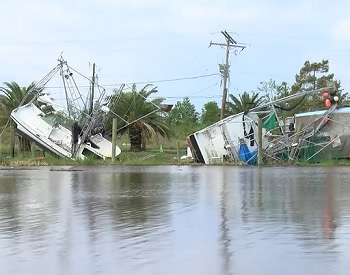
‘We take care of each other’ – Volunteers head to Lafitte to help hard hit residents and fishermen
After Hurricane Ida pummeled Lafitte, the fishing town’s fishermen pledge to keep going. The storm destroyed many of their boats, docks and homes. Volunteers distributed 500 meals to the fishing town’s workers and residents. “When someone, a stranger, shows up to lend you a hand, it gives you that little bit of a lift you need emotionally to get back out there to keep fighting and rebuild your life,” >click to read< – Volunteers head to Lafitte to help hard hit residents, and fishermen – Dozens of boats have been damaged or destroyed, and many wonder if the help will arrive before it’s too late. .,, While the food should help fuel recovery workers, homeowners, and shrimpers still have big needs “I lost my house, my boat, crab traps, I lost everything,” said crabber Nathan Fabre of Lafitte. Video>click to read< 13:10
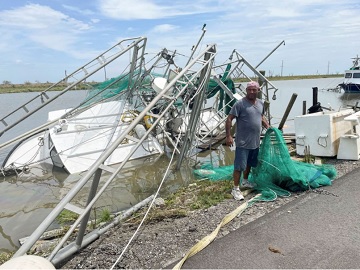
Louisiana shrimpers ‘try and survive’ after Ida sinks boats, destroys homes
Some 20%-30% of the fleet of shrimp boats in the Golden Meadow region of was wiped out by the powerful winds from the Category 4 Hurricane Ida that made landfall on Sunday, shrimpers said. The industry had already suffered lower seafood demand during the COVID-19 pandemic. Then the storm struck fishing communities southwest of New Orleans that had largely been spared when Hurricane Katrina pummeled the state 16 years ago. “We’ve never seen anything this powerful around here before,” said shrimper Russell Plaisance. Plaisance said local shrimpers lost 65%-70% of their revenue in 2020 as the pandemic shut restaurants. This year had been looking up for the top shrimp harvesting state, until the storm. >click to read< 19:04
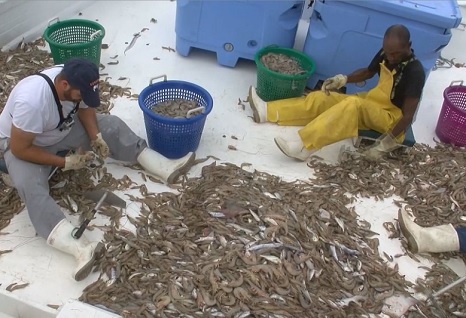
Along Georgia’s coast, shrimping remains an important industry
Shrimpers are known to be the heart of McIntosh County. However, they face significant challenges leading some to wonder if the industry will survive. “There’s a lot of work that goes into it, and long hours, at times, that goes into it,” Robert Todd said. It’s 4 a.m., as the Sundown and its crew leave the Wait-N-Sea dock in Townsend. “On our vessel right now, there’s three of us on the back deck.,, Todd and McKinzie say it’s a dwindling industry and look toward the younger generation to keep it afloat. “We don’t see the State of Georgia pushing commercial fishermen. This is still a trade. It is a complicated trade because you don’t learn how to commercial fish in a classroom,” >click to read< 16:26

Gov. Edwards announces program to help Louisiana shrimpers
Gov. John Bel Edwards announced the creation of a $250,000 program that will pay part of the cost shrimp fishermen will have to pay for mandated devices to protect sea turtles and other animals from getting trapped in their nets. The Louisiana Department of Wildlife and Fisheries will operate the Skimmer Turtle Excluder Device Reimbursement Program (STEDRP), which will reimburse up to 60 percent of the cost for two skimmer Turtle Excluder Devices, commonly called TEDs. >click to read< 12:02
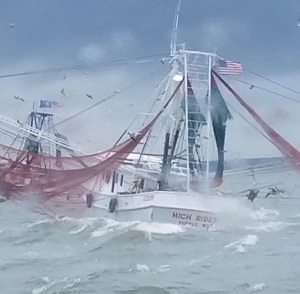
North Carolina shrimpers, fishermen concerned about mislabeled seafood
While brown shrimp, the most abundant of North Carolina’s shrimp landings, are typically harvested in the summer, now is the time for the whites, or green tails. “They are sweeter,” said Corey Galloway, with High Rider. “And when the water cools they are even better.” For Galloway, fall and winter weather improves a lot of local seafood. Breece Gahl of Fresh2U Seafood in Wrightsville Beach, for example, is looking forward to the wild oyster season, which begins Oct. 15. Until the pandemic, he often supplied seafood to restaurants. Earlier this year, Gahl switched to a “shore to door” delivery service and has been a regular at local farmers markets,, Pandemic related concerns aren’t at the forefront for this industry, though. Local shrimpers and fishermen are instead still being challenged by ongoing issues. >click to read< 07:35
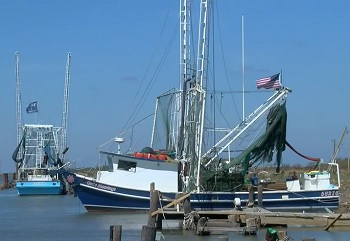
Hurricane Laura dealt a serious blow to the seafood industry in Cameron Parish
On a typical day in Cameron, you might see boats returning to shore with a catch of shrimp or fish. But Hurricane Laura has taken a severe toll on those who depend on seafood for their livelihood. Cameron Port Director Clair Marceaux says some have lost their boats. “Our fisheries folks have taken a really hard blow,” she said. “About a third of our fleet, estimated, has vessels that have sunk, so we’re working to get those out of the water. At safe harbor, they sunk, so it wasn’t as if they were left here and sank.” Plus she says some are also dealing with losing their homes. video, >click to read< 13:22
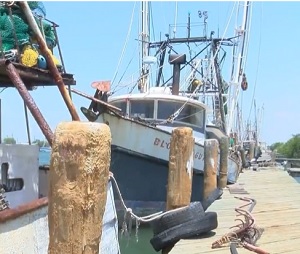
Brownsville: How Coronavirus pandemic is affecting shrimp producers
About two months ago, one of Andrea Hance’s boats came in with about 10,000 pounds of shrimp. Hance said on average the price of shrimp that they get from the boat is about $5, but buyers were not willing to pay that much. “They were coming back after they told us that they were not going to bid at all, you pressure them a little bit and then they said well we’ll give you a bid, but you’re not going to like it,” said Hance. “Well we ended up selling our shrimp for $3 a pound so we lost quite a bit of money on the last trip.” These are prices that John Keil Burnell, who is one of the owners of Shrimp Outlet in Brownsville, is seeing. Video, >click to read< 16:16
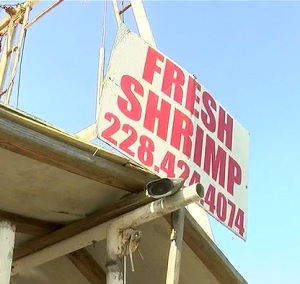
Shrimpers keep their fingers crossed for the upcoming season
It was a busy morning at the Biloxi Small Craft Harbor. Fishermen and shrimpers were getting ready for the 2019 Blessing of the Fleet while selling whatever fresh seafood they managed to catch overnight. “Jumbo shrimp are $4 a pound. How many do want?” asked one of the women selling shrimp on the back of her boat. As their boats pass along the water for a blessing from the priest, the people who make their living out on the water hope for some divine intervention. “Right now there is too much fresh water. No shrimp,” said Lien Nguyen. >video, click to read<
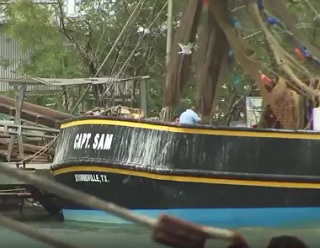
Shrimpers Still Impacted by Shortage of Workers
Shrimpers in the Rio Grande Valley say they are still experiencing a shortage of workers. Captain Jesus Moreno tells CHANNEL 5 NEWS it’s a tough job. He explains, new shrimpers quit within days and ask to go home. This year, the number of visas issued under the H2B program expanded. Still, only about 15 to 20 percent of the shrimpers received a visa worker. KRGV’s Christian von Preysing spoke with Andrea Hance with the Texas Shrimp Association. She says Texas shrimpers need a total of 750 workers. >click to watch<15:02
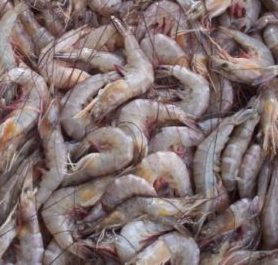
Lawmakers urge more FDA inspections of imported seafood, win approval
An effort to increase the amount of imported seafood the U.S. inspects for health issues has crossed a hurdle in the Senate. Louisiana’s two Republican senators, John Kennedy and Bill Cassidy, won approval of a measure that would add $3.1 million the FDA’s budget for such testing. Shrimpers in Terrebonne and Lafourche, joined by their peers in other states, have pushed for the measure,, The group represents shrimp fishermen and processors in Louisiana, Alabama, Florida, Georgia, Mississippi, North Carolina, South Carolina and Texas. Video >click to read<17:48

Take shrimper’s concerns seriously
Fourteen years ago Louisiana shrimpers joined those from other Gulf states and pooled their money — along with processors and dock owners — to pay millions of dollars in legal fees to bring a case for tariffs to the U.S. Department of Commerce and the International Trade Commission. The punitive tariffs that were approved, after this costly battle, were the result of findings that China and other nations were dumping shrimp into the U.S. at a below-market price or subsidizing the industry in some nations. The tariffs did some good but not enough. There is ample proof that shrimp were routed through other countries not contending with tariffs to defeat the process. The result has been more shrimp often raised in unsanitary farms and containing chemicals banned in the European Union but allowed in certain thresholds at U.S. docks. >click to read<17:01
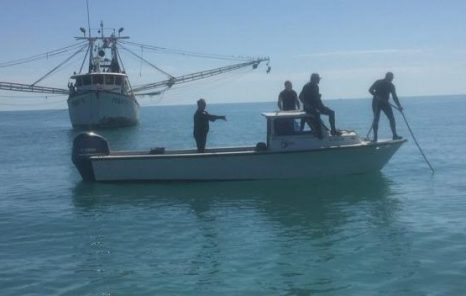
Newly discovered illegal reef off the coast of Lee County impacting shrimpers
An alert for one of Southwest Florida’s biggest industries after an illegal, manmade reef was discovered off the coast of Lee County. A shrimp net worth almost $2,000 was found tangled up in the illegal manmade reef. Fishermen discovered it about 9 miles off the shore of Fort Myers Beach – a place where many drop their nets to catch shrimp. Captain Mark Grunwale with Erickson and Jensen Shrimp Company spends weeks at a time fishing for shrimp with some pretty expensive equipment. “We know where a lot of them are at, but we didn’t know where this one was at,” Capt. Grunwale said. On Friday, divers from the Lee County Sheriff’s Office recovered a shrimp net caught in the illegal reef that not only impacted shrimpers but marine life as well. “There will be no knowing how it got there. This particular site is right in the middle of shrimp trolling lanes when they are coming out of Fort Myers Beach.” The net is believed to belong to a shrimp company out of Texas. Video, read the story here 19:38
Trump victory brings hope for shrimpers
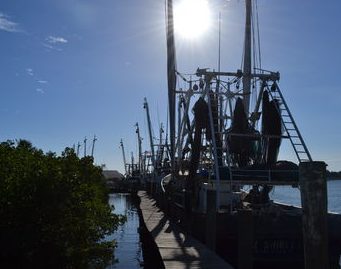 Roger Schmall’s shrimp boat engine lay in pieces on his deck. After the last one, which cost $35,000 came apart after only one trip out to sea, he’s decided to rebuild one himself to make sure it’s done right. Engines usually last 8 to 10 years, but he got a bad one, he said. He’s just got one boat these days, the Kayden Nicole, so his livelihood is tied to a working engine. Schmall’s spent the last 34 years working in the industry, and one of the few left of his ilk. Schmall is one of many local shrimpers who were hit hard when the U.S. began opening up to international trade through deals like the North American Trade Act (NAFTA), passed in 1994. During his campaign and in his 100 day plan which he outlined in his speech at Gettysburg in October, President Elect Donald Trump pledged to withdraw, or at least substantially change, some of the U.S.’s deals with other countries. Read the story here 10:03
Roger Schmall’s shrimp boat engine lay in pieces on his deck. After the last one, which cost $35,000 came apart after only one trip out to sea, he’s decided to rebuild one himself to make sure it’s done right. Engines usually last 8 to 10 years, but he got a bad one, he said. He’s just got one boat these days, the Kayden Nicole, so his livelihood is tied to a working engine. Schmall’s spent the last 34 years working in the industry, and one of the few left of his ilk. Schmall is one of many local shrimpers who were hit hard when the U.S. began opening up to international trade through deals like the North American Trade Act (NAFTA), passed in 1994. During his campaign and in his 100 day plan which he outlined in his speech at Gettysburg in October, President Elect Donald Trump pledged to withdraw, or at least substantially change, some of the U.S.’s deals with other countries. Read the story here 10:03
Brownsville Tx. – Shrimpers struggling to compete with imported shrimp
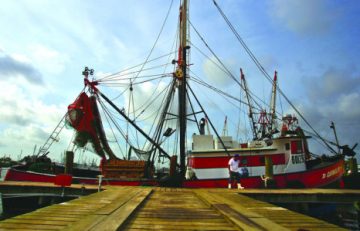 A slow start to the shrimping season has local shrimpers struggling to compete with imported farm-raised shrimp. Shrimpers are eager to return to local waters after being off for two months. “We have two boats and we’re probably one of the few people that actually jumped into this business without having a family history being in the business,” Texas Shrimp Association Executive Director Andrea Hance said. She’s been in the shrimping business since 2007. She said this season is slow, especially when it comes to their prized catch. “We have a niche market in terms of the large jumbo shrimp. We’re just not catching enough of them right now,” Hance said. She said they’re seeing a lot more small shrimp out in the Gulf which is unusual. A five-pound bag of locally-caught shrimp will cost someone about $30. Imported farm-raised shrimp will sell a similar bag for around $24. Video, Read the rest here 07:23
A slow start to the shrimping season has local shrimpers struggling to compete with imported farm-raised shrimp. Shrimpers are eager to return to local waters after being off for two months. “We have two boats and we’re probably one of the few people that actually jumped into this business without having a family history being in the business,” Texas Shrimp Association Executive Director Andrea Hance said. She’s been in the shrimping business since 2007. She said this season is slow, especially when it comes to their prized catch. “We have a niche market in terms of the large jumbo shrimp. We’re just not catching enough of them right now,” Hance said. She said they’re seeing a lot more small shrimp out in the Gulf which is unusual. A five-pound bag of locally-caught shrimp will cost someone about $30. Imported farm-raised shrimp will sell a similar bag for around $24. Video, Read the rest here 07:23
Commercial fishermen need our support
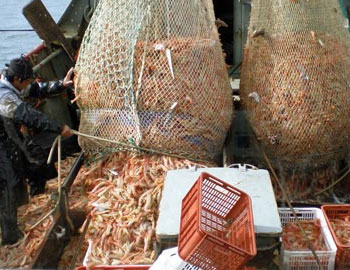 In Dulac and Golden Meadow, Chauvin and Pointesaux-Chenes, shrimpers are readying their vessels for a new season, hoping that nature and the markets will smile on their efforts, and provide not only a bountiful crop but prices that will support their livelihoods. Like the shrimpers, crabbers and oystermen have faced significant challenges, and all are working hard as always to keep afloat. The visible signs of their industry, located as they are in communities where many of us don’t spend time unless recreating, go unseen by most of us. But they are there, day in and day out. They know that their numbers have dwindled, that their infrastructure – the packing houses to which many sell their harvests – is dwindling as well. Read the op-ed here 08:44
In Dulac and Golden Meadow, Chauvin and Pointesaux-Chenes, shrimpers are readying their vessels for a new season, hoping that nature and the markets will smile on their efforts, and provide not only a bountiful crop but prices that will support their livelihoods. Like the shrimpers, crabbers and oystermen have faced significant challenges, and all are working hard as always to keep afloat. The visible signs of their industry, located as they are in communities where many of us don’t spend time unless recreating, go unseen by most of us. But they are there, day in and day out. They know that their numbers have dwindled, that their infrastructure – the packing houses to which many sell their harvests – is dwindling as well. Read the op-ed here 08:44
Fish, shellfish recovered from Katrina faster than fishermen
As Hurricane Katrina lashed everything above ground, it also caused problems for seafood in the waters of the Gulf of Mexico. With the exception of oysters, seafood does OK during hurricanes,” Caffey said. “The sediment can smother an oyster bed and cause short-term losses. Long term, fishermen don’t do well.” That’s because fishermen rely on boats, processing plants and docks that get walloped by the hurricanes, and that leaves livelihoods in danger. Read the rest here 17:06
Shrimpers, Crabbers Learn New Regulations at Louisiana Fisheries Meeting
 Shrimpers and crabbers learned about the newest regulations, techniques and equipment at a Louisiana Fisheries Forward meeting on March 24, organized by the LSU AgCenter and Louisiana Sea Grant. Thu Bui, LSU AgCenter and Louisiana Sea Grant fisheries agent, said the meetings are intended to help fishers learn about new developments before their peak seasons get underway soon. “It makes them more professional and gives them the information so they can become more profitable,” Read the rest here 09:55
Shrimpers and crabbers learned about the newest regulations, techniques and equipment at a Louisiana Fisheries Forward meeting on March 24, organized by the LSU AgCenter and Louisiana Sea Grant. Thu Bui, LSU AgCenter and Louisiana Sea Grant fisheries agent, said the meetings are intended to help fishers learn about new developments before their peak seasons get underway soon. “It makes them more professional and gives them the information so they can become more profitable,” Read the rest here 09:55
Researchers, shrimpers look for black gill shrimp in Georgia
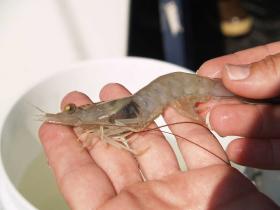 This wasn’t your typical cruise. For starters, the day-long journey around Chatham County waterways on the 92-foot R/V Savannah on Thursday was focused on a tiny parasite on shrimp that turns their gills an unsightly and unmarketable black. And instead of scientists researching the problem by themselves and reporting their results in a scientific journal years from now, they invited along shrimpers,,, Video, Read the rest here
This wasn’t your typical cruise. For starters, the day-long journey around Chatham County waterways on the 92-foot R/V Savannah on Thursday was focused on a tiny parasite on shrimp that turns their gills an unsightly and unmarketable black. And instead of scientists researching the problem by themselves and reporting their results in a scientific journal years from now, they invited along shrimpers,,, Video, Read the rest here
Georgia: Shrimpers caught fishing illegally
 Six Georgia fishermen are in hot water for allegedly catching hundreds of pounds of shrimp in state waters before legally allowed to do so. Rangers caught two boats and crews jumping the gun – the first on May 29 and the second on Saturday. Read more here 07:30
Six Georgia fishermen are in hot water for allegedly catching hundreds of pounds of shrimp in state waters before legally allowed to do so. Rangers caught two boats and crews jumping the gun – the first on May 29 and the second on Saturday. Read more here 07:30
Macaluso: Years have changed Louisiana shrimp plan
Back then, as many as 100 shrimpers expressed their opinions on what action the seven-member commission should take for those all-important opening dates. Today, the process is so routine, so accepted, that it drew only two comments, and those came from Vermilion Bay interests, and one was about how much trouble abandoned crab traps cause Vermilion shrimpers. Read more here 18:43






